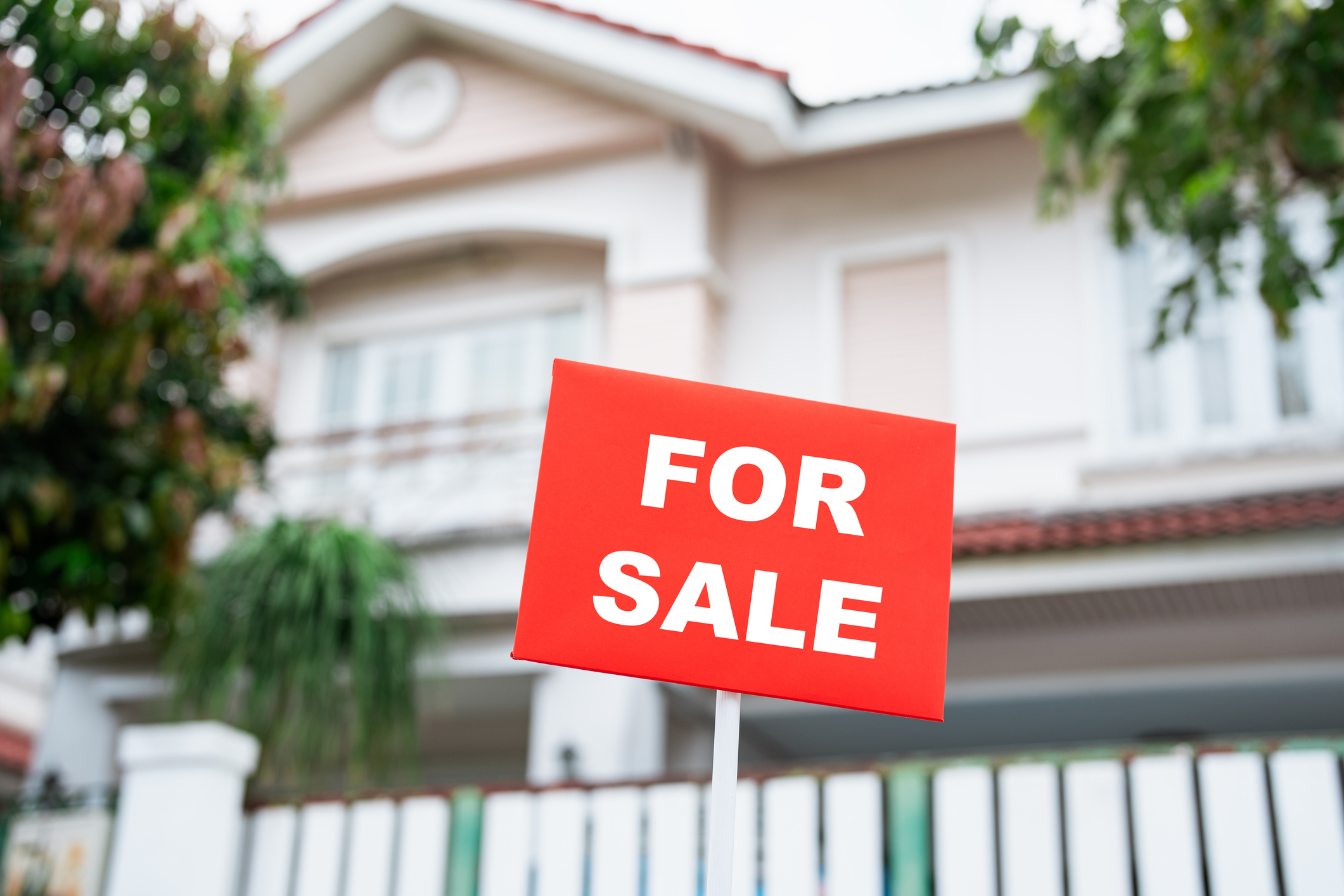How Much Does It Cost to Sell a House? Don’t Overlook These Common Fees
From agent commissions to closing costs and repairs, selling your home comes with more expenses than many homeowners expect.

Carla Ayers
Profit and prosper with the best of Kiplinger's advice on investing, taxes, retirement, personal finance and much more. Delivered daily. Enter your email in the box and click Sign Me Up.
You are now subscribed
Your newsletter sign-up was successful
Want to add more newsletters?

Delivered daily
Kiplinger Today
Profit and prosper with the best of Kiplinger's advice on investing, taxes, retirement, personal finance and much more delivered daily. Smart money moves start here.

Sent five days a week
Kiplinger A Step Ahead
Get practical help to make better financial decisions in your everyday life, from spending to savings on top deals.

Delivered daily
Kiplinger Closing Bell
Get today's biggest financial and investing headlines delivered to your inbox every day the U.S. stock market is open.

Sent twice a week
Kiplinger Adviser Intel
Financial pros across the country share best practices and fresh tactics to preserve and grow your wealth.

Delivered weekly
Kiplinger Tax Tips
Trim your federal and state tax bills with practical tax-planning and tax-cutting strategies.

Sent twice a week
Kiplinger Retirement Tips
Your twice-a-week guide to planning and enjoying a financially secure and richly rewarding retirement

Sent bimonthly.
Kiplinger Adviser Angle
Insights for advisers, wealth managers and other financial professionals.

Sent twice a week
Kiplinger Investing Weekly
Your twice-a-week roundup of promising stocks, funds, companies and industries you should consider, ones you should avoid, and why.

Sent weekly for six weeks
Kiplinger Invest for Retirement
Your step-by-step six-part series on how to invest for retirement, from devising a successful strategy to exactly which investments to choose.
If you’re planning to put your house on the market, you might be focused on price. But this isn’t the only factor to consider before you stick a “for sale” sign in front of your home.
From agent commissions to closing costs and potential home improvements, the expenses can add up quickly. Understanding these upfront costs can help you maximize your profit and avoid last-minute surprises. Whether you’re upgrading to a bigger space, downsizing or relocating, knowing what to expect can make the selling process smoother and more financially rewarding.
Let's get into the costs of selling a house, including some of the hidden ones.
From just $107.88 $24.99 for Kiplinger Personal Finance
Become a smarter, better informed investor. Subscribe from just $107.88 $24.99, plus get up to 4 Special Issues

Sign up for Kiplinger’s Free Newsletters
Profit and prosper with the best of expert advice on investing, taxes, retirement, personal finance and more - straight to your e-mail.
Profit and prosper with the best of expert advice - straight to your e-mail.
Agent fees
Typically, home sellers are responsible for paying commissions for both the listing agent and the buyer’s agent. On average, real estate commissions run at 5% to 6% of a home’s sale price, with the money split between the seller’s and buyer’s agents.
On a $400,000 home, a 5% to 6% commission would equate to $20,000 - $24,000. (The median existing home sales price in the U.S. in July 2025 was $435,300, according to the National Association of Realtors.)
However, commission rate standards can vary depending on where you live. For instance, the average real estate commission in Georgia is 5.62%, compared to an average commission of 4.47% in Massachusetts, according to a recent Clever survey of real estate agents.
Granted, real estate commissions aren’t set in stone. Around four out of 10 real estate agents said they're willing to negotiate their commission rates, a FastExperts survey found.
Pre-sale home repairs
Many homes need fixing up before they go on the market for sellers to get top dollar. And today’s buyers have high expectations: 77% of house hunters recently surveyed by Curbio said they wouldn't consider a home that isn't move-in-ready.
While pre-sale home repair expenses can vary depending on the age of the property and its condition, sellers who make repairs before listing spend an average of $14,163, according to recent Realtor.com data.
Staging
Although it’s not a requirement, staging your home — where you declutter and decorate — can help your property sell quicker and for more money.
Consider that 20% of buyer’s agents say staging increases the value offered by 1% to 5% compared to similar homes on the market that aren’t staged, according to the National Association of Realtors’ Profile of Home Staging.
On average, staging costs between $800 and $2,800, HomeGuide reports. Although expenses can vary depending on the number of rooms and the length of the selling period.
Closing costs
Closing costs can vary too. Sellers typically pay closing fees of 1% to 3% of their home’s sale price to cover attorney’s fees, transfer taxes, title insurance fees, recording fees and outstanding property taxes.
That equates to $4,000 to $12,000 for a $400,000 house.
Moving expenses
The average professional local move (under 100 miles) costs $7,600, according to Move.org. A professional long-distance move, on the other hand, averages $9,140.
Pro tip: Treat moving estimates as a range, not a guarantee. Even well-documented quotes can change once movers account for time, weight or last-minute complications.
Also, don’t forget tipping. A good tip is $5 to $10 per worker per hour, according to Consumer Affairs.
Planning to move yourself? According to Angi.com (formerly Angie’s List), these are the typical costs for moving supplies:
- Moving boxes: $1 to $10 per box, depending on size
- Packing tape: $2 to $4 per roll
- Furniture pads: $8 each
- Packing paper: $10 per 10-pound box
- Bubble wrap: $20 per box
- Foam packing peanuts: $5 per bag
Rental trucks typically cost $130 for a small local move to over $3,000 for a long-distance move, according to Move.org.
That doesn’t include gas, insurance and towing equipment, such as a trailer or tow dolly.

Other costs for home sellers
Depending on your circumstances, you may also incur these expenses at closing:
- Mortgage payoff: If you still have a balance on your mortgage, you’ll need to pay it off at settlement. This is typically done using a portion of the proceeds from your home sale. Ideally, you'd have enough equity to pay off your loan balance and to cover closing costs.
- Capital gains taxes: Single home sellers selling their primary residence can usually exclude up to $250,000 of capital gains, while married couples filing jointly can usually exclude up to $500,000. If you exceed those exemptions and have owned your home for longer than a year, you can expect long-term capital gains tax rates of anywhere from zero to 20% depending on your taxable income.
- Seller concessions: If you agreed to cover some of the buyer’s closing costs, you’ll pay them in the form of seller concessions at settlement. Another type of concession is a mortgage rate buydown, where you pay money to reduce the buyer’s interest rate.
The bottom line
Selling a home comes with its fair share of costs, from agent commissions to closing fees, but careful planning can help you keep money in your pocket.
So whether you’re reinvesting in a new property or simply looking to walk away with the best possible return, get to know the costs ahead of time to navigate the process with confidence.
Use the tool below, in partnership with Bankrate, to compare offers from different mortgage lenders.
Related Content
Profit and prosper with the best of Kiplinger's advice on investing, taxes, retirement, personal finance and much more. Delivered daily. Enter your email in the box and click Sign Me Up.

Daniel Bortz is the Personal Finance Editor at AARP and is based in Arlington, Va. His freelance work has been published by The New York Times, The Washington Post, Consumer Reports, Newsweek, and Money magazine, among others.
- Carla AyerseCommerce and Personal Finance Editor
-
 Quiz: Do You Know How to Avoid the "Medigap Trap?"
Quiz: Do You Know How to Avoid the "Medigap Trap?"Quiz Test your basic knowledge of the "Medigap Trap" in our quick quiz.
-
 5 Top Tax-Efficient Mutual Funds for Smarter Investing
5 Top Tax-Efficient Mutual Funds for Smarter InvestingMutual funds are many things, but "tax-friendly" usually isn't one of them. These are the exceptions.
-
 AI Sparks Existential Crisis for Software Stocks
AI Sparks Existential Crisis for Software StocksThe Kiplinger Letter Fears that SaaS subscription software could be rendered obsolete by artificial intelligence make investors jittery.
-
 We Retired at 62 With $6.1 Million. My Wife Wants to Make Large Donations, but I Want to Travel and Buy a Lake House.
We Retired at 62 With $6.1 Million. My Wife Wants to Make Large Donations, but I Want to Travel and Buy a Lake House.We are 62 and finally retired after decades of hard work. I see the lakehouse as an investment in our happiness.
-
 I'm an Opportunity Zone Pro: This Is How to Deliver Roth-Like Tax-Free Growth (Without Contribution Limits)
I'm an Opportunity Zone Pro: This Is How to Deliver Roth-Like Tax-Free Growth (Without Contribution Limits)Investors who combine Roth IRAs, the gold standard of tax-free savings, with qualified opportunity funds could enjoy decades of tax-free growth.
-
 I'm a Real Estate Investing Pro: This Is How to Use 1031 Exchanges to Scale Up Your Real Estate Empire
I'm a Real Estate Investing Pro: This Is How to Use 1031 Exchanges to Scale Up Your Real Estate EmpireSmall rental properties can be excellent investments, but you can use 1031 exchanges to transition to commercial real estate for bigger wealth-building.
-
 My Spouse and I Are Saving Money for a Down Payment on a House. Which Savings Account is the Best Way to Reach Our Goal?
My Spouse and I Are Saving Money for a Down Payment on a House. Which Savings Account is the Best Way to Reach Our Goal?Learn how timing matters when it comes to choosing the right account.
-
 The High Cost of Sunshine: How Insurance and Housing Are Reshaping Snowbird Living
The High Cost of Sunshine: How Insurance and Housing Are Reshaping Snowbird LivingThe snowbird lifestyle is changing as insurance and housing costs climb. Here’s how retirees are adapting and where they’re choosing to go.
-
 How to Turn Your 401(k) Into A Real Estate Empire — Without Killing Your Retirement
How to Turn Your 401(k) Into A Real Estate Empire — Without Killing Your RetirementTapping your 401(k) to purchase investment properties is risky, but it could deliver valuable rental income in your golden years.
-
 We're 62 With $1.4 Million. I Want to Sell Our Beach House to Retire Now, But My Wife Wants to Keep It and Work Until 70.
We're 62 With $1.4 Million. I Want to Sell Our Beach House to Retire Now, But My Wife Wants to Keep It and Work Until 70.I want to sell the $610K vacation home and retire now, but my wife envisions a beach retirement in 8 years. We asked financial advisers to weigh in.
-
 We Inherited $250K: I Want a Second Home, but My Wife Wants to Save for Our Kids' College.
We Inherited $250K: I Want a Second Home, but My Wife Wants to Save for Our Kids' College.He wants a vacation home, but she wants a 529 plan for the kids. Who's right? The experts weigh in.